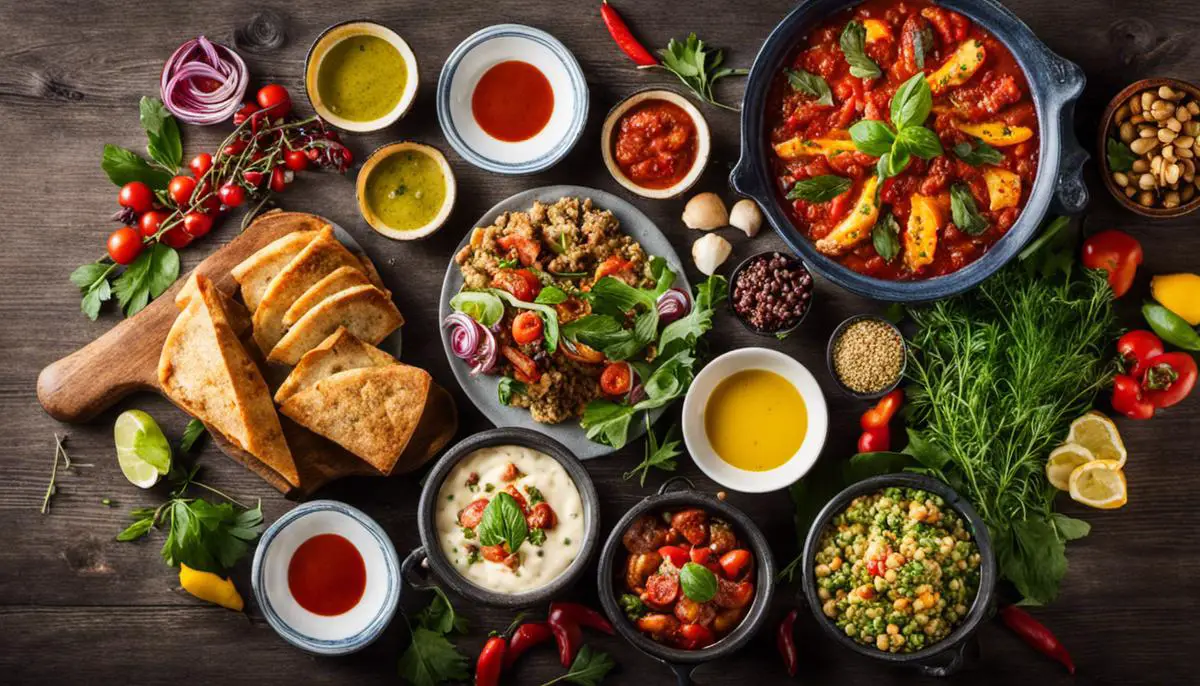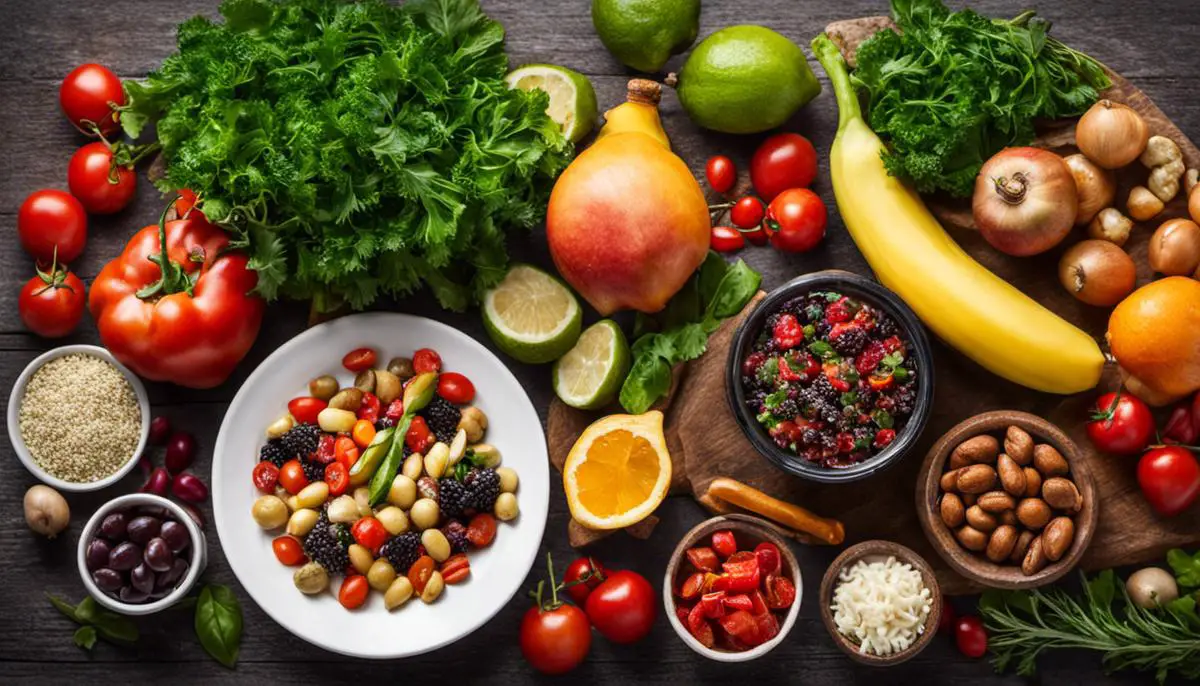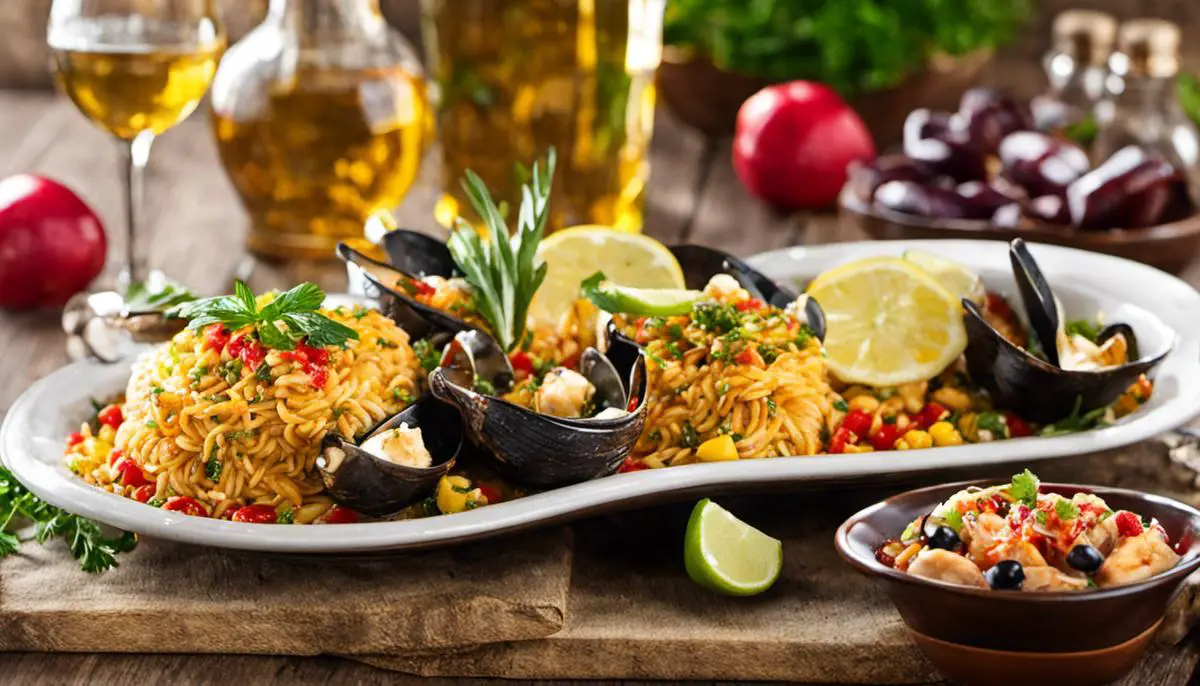Immerse yourself in a journey that unfolds the wonder of the Mediterranean Diet, a vibrant eating style that takes you through beautiful landscapes, rich cultures, and delightful flavors. Among the countless diets that modern culture has to offer, the Mediterranean Diet is celebrated for its heart and health-friendly approach, offering an all-encompassing balance between pleasure and well-being. Based on the food habits of countries bordering the Mediterranean Sea, this style of eating emphasizes the central role of olive oil, fish, fresh fruits, vegetables, and whole grains. The magic doesn’t end just at the food; the Mediterranean Diet nationalizes the warmth of shared meals, the joy of cooking, and the delights of a glass of wine. In this enlightening journey, you will discover the health rewards, exciting flavors, and simple ways to integrate this diet into your everyday routine.
Understanding the Mediterranean Diet
Dining is more than just an act of survival—it’s a festival of flavors, a communion of cultures, and a road map to history.
The Mediterranean diet is one such culinary experience that stands as a testament to this philosophy. It is woven from the threads of rich history, interconnected cultures, and the vibrant swathes of Mother Nature’s color palette. Each ingredient and cooking method is a narrative of the lands bathed by the Mediterranean sun, whispering tales of trade, harvests, and the zest for life.
A true jewel of a gastronomic journey, the Mediterranean diet brings together the culinary traditions of 21 countries that border the Mediterranean Sea. Greece, Italy, Spain, and France are some of the flag-bearers of this cuisine celebrated for its flavors, variety, and health benefits.
What makes the Mediterranean diet a standout is the striking balance it strikes between taste and health. Heart-healthy olive oil is a signature of this cuisine, taking the stage in dishes from velvety hummus to luscious Italian pasta. A diet footed on whole grains, lean proteins from the sea, fresh fruits, vegetables, and a delightful array of herbs, it’s a masterstroke in the art of healthy living without compromising on flavor.
Grapes ripening under the Mediterranean sun transform into exquisite wine, an integral part of this cuisine. The diet acknowledges the joy of dining, urging the savoring of meals, sometimes with a glass of wine, in the good company of friends and family. After all, what better way to toast to good health?
Furthermore, it is not just the ingredients, but the very art of cooking that promotes this balance in the Mediterranean diet. The method of cooking focuses on preserving the nutritional value of the food while amplifying its flavors. Fish and poultry are primarily grilled or baked, vegetables are lightly sautéed, and food quantities are balanced ensuring portion control; it’s a culinary technique that whispers rather than shouts, underscoring the inherent symphony of fresh, quality ingredients.
Another crucial aspect is the grand spectrum of flavors and textures. From the pungent teasing of garlic, the tangy playfulness of lemon, the tactile joy of crusty bread steeped in olive oil, to the symphony of spices from different regions – it’s a veritable feast for the senses! Each dish resonates with the individual identity of the regions, and yet, comes together to create a harmonious culinary universe.
Undeniably, this diet built on moderation makes way for indulgences too. Mediterranean desserts like Baklava or Tiramisu aren’t just sweet finishes; they are poetic expressions of culture, seasons, and the joy of simple ingredients transformed into something sublime.
As every meal concludes, it echoes the sentiment that emboldens the Mediterranean diet – ‘to live each day like a feast’. The Mediterranean culinary tradition is not just a diet that catalogs what to eat. It is a lifestyle, a paradigm of balance, a sensory celebration, and a cultural journey of epic proportions. In the mingling of olive oil and wine, soft cheese and crusty bread, fresh herbs, and vibrant spices, it isn’t just the food that’s being shared; it’s stories, laughter, warmth, and the indomitable human spirit. A Mediterranean meal is always a revelation, a slice of life, generously shared, and joyously savored.

Health Benefits of the Mediterranean Diet
Beyond the exquisite multitude of flavors and delectable culinary combinations, the Mediterranean diet emerges as an undeniably healthier approach to daily nutrition. Key factors to note here include not just the ingredients used, but also the portions and frequency of meals.
An inherent characteristic of the Mediterranean diet is the moderate intake of certain food items and infrequent indulgence in others. Cheese and yogurt, for instance, are consumed regularly but in moderate quantities. Red meat, on the other hand, is a rare presence on the dinner plate, savored only seldom.
Fish, a staple protein source, is consumed with a celebratory frequency. Rich in omega-3 fatty acids, fish like tuna, salmon, and trout promote healthy heart function, contribute to brain health, and can even mitigate some mental health issues. Hence, it is no surprise that frequent seafood dinners are a common scene around the Mediterranean coastline.
Portion control is another integral aspect of this seemingly indulgent yet impressively balanced diet plan. Rather than restricting food, Mediterranean eating habits focus on enjoying moderate quantities of diverse food items. It is the championing of satiety over fullness, emphasizing a lifestyle where eating well doesn’t equate to eating excessively.
The timing and ritual surrounding meals in the Mediterranean diet also play a big role in promoting a healthier lifestyle. It subscribes to the mantra of starting the day with a hearty breakfast full of fiber and nutrients, keeping in stride with the adage – “Breakfast like a king”. Small meals during the day keep the metabolism active and ensure a steady supply of energy, avoiding the often-experienced mid-day dips in productivity.
The Mediterranean diet also ushers in the cultural practice of taking the time to savor every bite. Meals are prolonged, sociable affairs celebrated together with conversation and camaraderie. This slow eating habit also aids digestion, encourages portion control, and parties to emotionally satisfying experiences around food.
Last but not least, physical activity completes the holistic approach of the Mediterranean lifestyle towards health. It is common to find residents of these Mediterranean regions leading active lives, whether through daily labor, habitual walks, or regular swimming – a testament that dietary habits coupled with physical activity form the foundation of a truly healthier lifestyle.
In essence, the Mediterranean diet, with all its rich flavors, tantalizing aromas, and vibrant textures, champions not just the act of eating, but celebrating, sharing, and living with food, making it a cornerstone of good health for mind, body, and soul. A gleaming example of this wisdom is their unique take on dessert. Rather than processed sugars, dessert often features fresh fruit, honey, and nuts, proving that even indulgence can be healthful and enjoyable. The Mediterranean diet is indeed less about restriction and more about explorers, adopting a holistic approach to eating and living healthily.

Implementing the Mediterranean Diet
From the sun-soaked olive groves of Greece to the azure coastlines of Spain, the Mediterranean diet is not simply about what’s on the plate; it’s about a symphony of life habits that blend seamlessly into a way of being. With the Mediterranean diet, every morsel of food consumed is like a note in an orchestral piece, contributing to the symphony of health and well-being.
Meal planning is an essential stage in curating a Mediterranean kitchen, but it doesn’t have to be a chore. Quite the opposite, it’s a delightful exploration of different ingredients and food pairings. Organizing your pantry and refrigerator with staples such as fresh fruits, vegetables, whole grains, legumes, nuts and seeds is the groundwork. Prioritize local, seasonal produce to ensure your meals are packed with optimal nutrition.
Fish, particularly fatty species like salmon, tuna, mackerel, and sardines, are populous in the Mediterranean diet with their omega-3 fatty acids known to confer heart health benefits. However, while fish may be more commonly expected, poultry also has a place at the Mediterranean table. It’s all about balance and giving a cornerstone to plant-based proteins.
And what about adding a dash of adventure to your meals? The condiments and seasonings of the Mediterranean diet can transport your taste buds to another realm. Generously toss in flavorful herbs like basil, oregano, parsley, rosemary, and dill into your recipes. Extra virgin olive oil, often referred to as liquid gold among Mediterranean folks, promises to elevate dishes with a nuance of butteriness and vibrance.
Is the day feeling a bit too long? Do what Mediterraneans do: go for a simpler ‘meze’ or ‘tapas’ style. These are small, appetizing spreads comprising varied dishes like hummus, tzatziki, marinated olives or feta, stuffed grape leaves, or lightly grilled seafood. These mini-meals can be savored with an intimate gathering of friends, engaging in animated conversation, laughter, and shared experiences.
Diversify your drinking habits as well! Tea, particularly green and herbal varieties like mint, chamomile, or sage, is a staple beverage of the Mediterranean region. Wine, notably red types, is enjoyed modestly, often savored with meals. As always, moderation is the key.
Standing and eating? Not! Mediterraneans see meals as opportunities to bond, engage in hearty conversations, and cherish the company of others around bountiful tables. The practice of mindful eating — appreciating each bite and flavor — slows the consuming process and results in better digestion and satisfaction levels.
Play an active role in your health, adopting the Mediterranean penchant for an active lifestyle. Incorporating daily physical activities like walking, cycling, or swimming makes the journey not just about eating but living the Mediterranean way.
Lastly, remember there’s always room for dessert! However, in the Mediterranean diet, dessert usually comes in the form of fresh fruit or a nibble of cheese. On special occasions, sweets like Baklava, gelato, or a drizzle of honey over Greek yogurt may appear. Even here, the theme remains — natural sweetness over processed sugars, indulgence balanced with health.
Incorporating the Mediterranean diet into everyday life is about embracing a mindset, one where joy, health, flavor, friends, and sharing are at the very heart of existence. It’s about embracing the rhythm of Mediterranean life, turning every ingredient, meal, and gathering into an enchanting dance of flavors and pleasures. It’s not a restrictive diet plan, but a delightful, rewarding journey towards a healthier lifestyle. Let the Mediterranean kitchen inspire a fresh approach to not just eating but joyful living. One meal at a time, let your life be transformed.

Exploring Mediterranean Cuisine
Diving deeper into the Mediterranean diet – a vast narrative of tantalizing flavors, palatable textures, and vibrant colors – reveals a mosaic of dishes that encapsulate the essence of a healthy, hearty, and fundamentally easy-to-adopt lifestyle. Influential ingredients in these staple dishes include seafood, whole grains, legumes, fruits, vegetables, and lean meats, all bustling with flavors and nutritional value.
Paella, a much-celebrated dish from Spain, is a fascinating display of gastronomic elegance and healthful components. Shrimp, mussels, and white fish simmered gently with saffron-infused rice and embellished with garden-fresh bell peppers and peas, resulting in a culinary masterpiece high in protein and brimming with bold flavors. This seafood paella epitomizes the spirited celebration of fresh produce and quality ingredients common in Mediterranean cooking.
Greek Salad, is more than just a green salad, is a medley of ripe, juicy tomatoes, crisp cucumbers, sharp onions, and buttery Kalamata olives. Elevated by the richness of Feta cheese and a spritz of fresh lemon juice, it’s a symphony of tastes and textures, harmonizing the freshness of garden produce with the allure of a simple yet remarkably flavorful dish.
Pesto, an aromatic blend of basil, pine nuts, Parmesan cheese, and extra virgin olive oil is a classic from Italy. It’s a versatile sauce that effortlessly enhances pasta, chicken, or vegetables with its powerful, herby notes. Its incorporation of nuts and olive oil, followed by moderate use of cheese, makes pesto an embodiment of the balanced approach taken within the Mediterranean diet.
Tunisian Shakshuka, a hearty dish of eggs poached in a fiery, cumin-infused tomato sauce, beautifully mirrors the comforting yet bold flavors of North Africa. Rich in protein from the eggs and packed with lycopene from the tomatoes, it showcases the celebration of humble ingredients transformed into a healthful feast.
Lastly, no discourse on Mediterranean food would be complete without acknowledging its mouthwatering array of sweets. Greek Baklava – a flaky, nut-filled pastry soaked in honey – champions the region’s penchant for using nuts, honey, and spices like cinnamon in their desserts. While indulgent, these components provide an additional layer of health benefits, offering a guilt-free sweet treat alternative.
Beyond the sustenance they provide, these dishes, much like the diet itself, are an expression of a sun-drenched lifestyle that takes pleasure from food, cherishes the diversity of flavors, and yet remains deeply rooted in overall wellness. It embodies the adage – food is medicine – but in the Mediterranean context, this medicine is the tastiest you will ever savor. Educate the palate, satiate the senses, and invest in health – that’s the delightful promise of the Mediterranean diet. See these heartening dishes not only as delicious meals but as an invitation to share, to experience, and to enjoy life the Mediterranean way. It’s about balance, variety, and above all, enjoying the gastronomic journey! From their kitchen, with love.

Having journeyed through the nuances and delights of the Mediterranean Diet, it equips us with a new and empowering understanding of food, its cultural roots, and its impacts on our health. This lifestyle, interspersed with the vibrance of fresh produce, the richness of healthy fats, and the wholesomeness of shared meals, offers a holistic and pleasurable approach to nourishing ourselves. Venturing beyond the dietary boundaries, it’s more than just a diet; it’s a celebration of food, a homage to its cultural heritage, and a testament to its proven benefits. So let’s don our aprons, stock up our pantries, and embrace the Mediterranean way of eating – filled with health, brimming with taste, and glowing with the warmth of shared joy.
